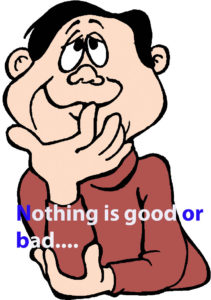 “…for there is nothing either good or bad, but thinking makes it so.” (Hamlet act 2, sc. 2)
“…for there is nothing either good or bad, but thinking makes it so.” (Hamlet act 2, sc. 2)
Tips for Use. When you try to rationalize a difference of opinion on a matter that can be judged one way or another. Short as it is, the line embodies a profound philosophical and practical truth the consequences of which we see or experience every day.
Given the almost infinite source of examples current and past let’s take one at random.
Today, if consulted about it, almost everyone will say that we live in a democracy under a regime of free trade. A minimal consideration would show that this is a colossal fib. Politically, decisions are taken by (or imposed onto) individuals who have no connection whatsoever with those who will be affected by those decisions. ‘Free’ trade? A gross semantic misconception thanks to the very free interpretations possible for what ‘free’ means. In current parlance ‘free’ trade means the imposition on national governments of market conditions (by a supranational superstructure, such as the IMF or similar)) that call for the wholesale dislocations (and/or misery) of entire people to satisfy the laws of the market. And who says that the laws of the market are actually ‘laws’ instead of structural arrangements to benefit the 1%? Arrangements facilitated by sundry political parasites who often have no idea of the laws they are signing?
In the instance the so-called ‘law of the market’ has converted man (his labor) and his house into commodities. Who says it must be so? Historically it is a phenomenon of the 19th century. And it is what created such conditions in England, the dominant empire, that millions were literally starving. Many didn’t have the money to bury their dead (re-reading Dickens may be instructive). Etc. etc.
It was Von Mises, the Jesus Christ of turbo-capitalists who discovered the solution to unemployment. Reduce wages indefinitely until people will take any job to satisfy the pangs of hunger.
The analysis is summary due to the nature of blogs. But the conclusion is inevitable. If you benefit from misery, “democracy” and “free trade” your thinking makes them good. If not, no (good).
To receive an (almost) daily copy of the latest blog and Shakespearean verbal ‘weapon’ enter your details in the contact form or click on “Entries RSS” at the bottom of the column on the right hand site of this page. And I promise, no sales calls, trade leads, venomous schemes, hidden plots, commercial ploys, psychological tricks, leads exchanges, barter proposals, suggestions or offers of any kind imaginable (and unimaginable).
Of course, if you acquire the book “Your Daily Shakespeare” you will not only enjoy it but you will find it very useful. The quote in this post and more than ten thousand others will lead you to find the words that perfectly strengthen your argument(s). After all Shakespeare wrote them, I simply extracted, structured and compiled them so as to make Shakespeare very “user friendly” as they say. And if you wish I will even sign the book. But this is the extent of any “sales” effort, call or solicitation.
Original Image from www.sodahead.com
